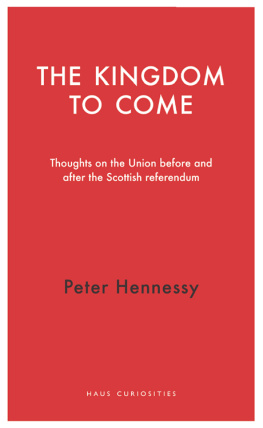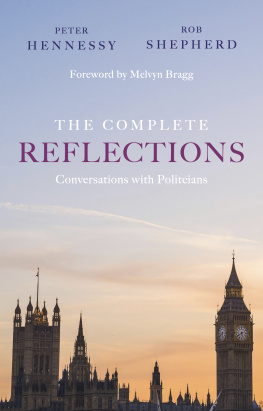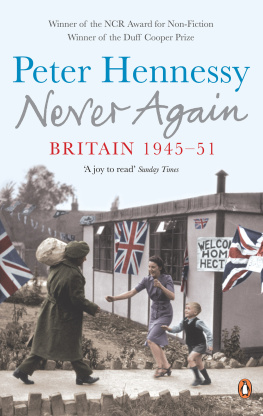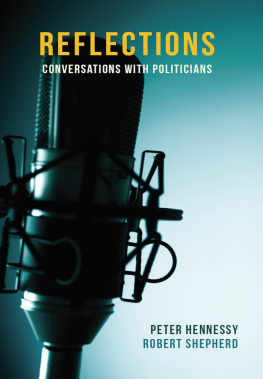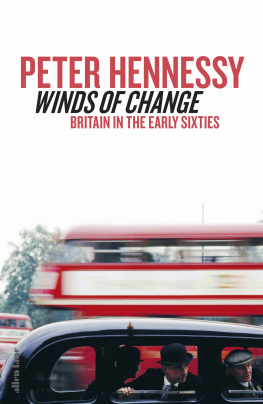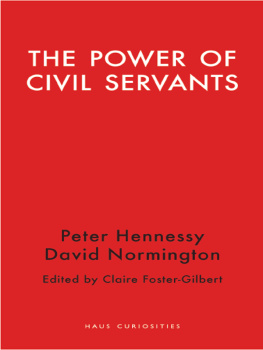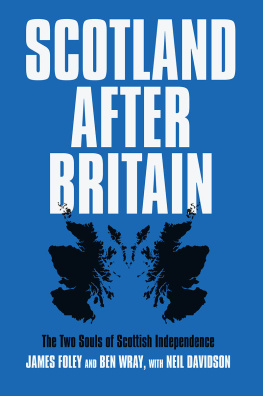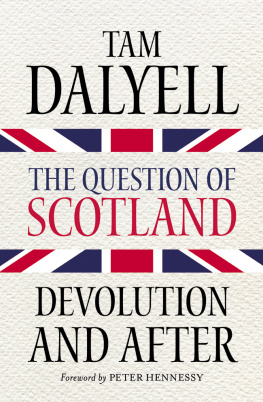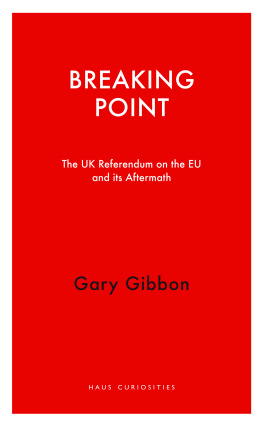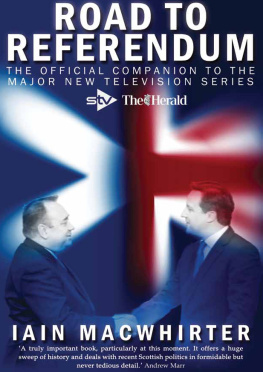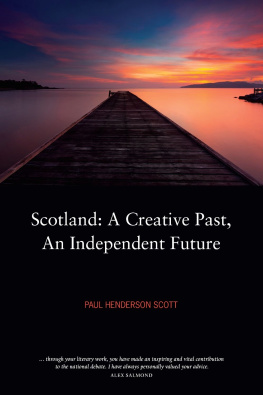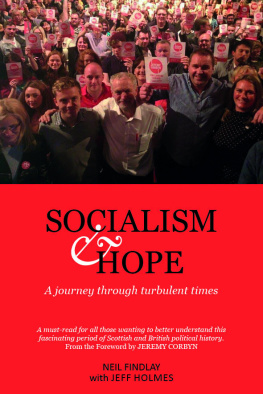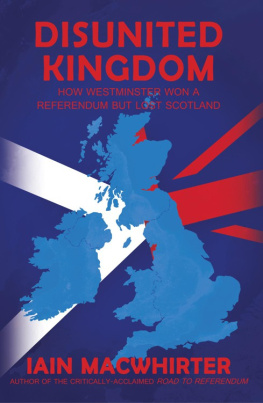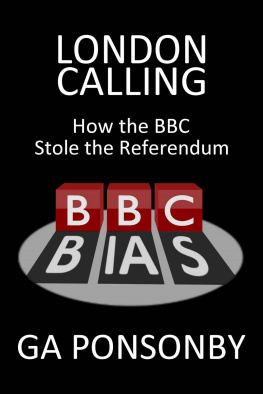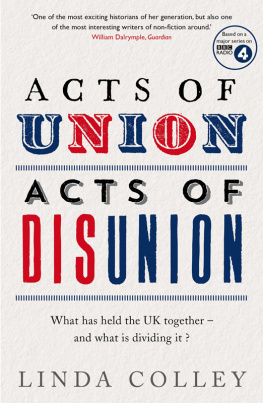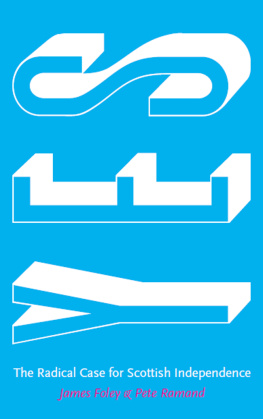For Cecily, Mick, Joe and Jack Cromby
My family in Scotland
About the Author
Peter Hennessy was educated at Marling School, Stroud; St Johns College, Cambridge; the London School of Economics; and Harvard, where he was a Kennedy Scholar 197172. He spent 20 years in journalism with spells on The Times, the Financial Times and The Economist and as a presenter of the BBC Radio 4 Analysis programme. He is a Fellow of the British Academy and sits as an independent crossbench peer in the House of Lords as Lord Hennessy of Nympsfield. He is Attlee Professor of Contemporary British History at Queen Mary, University of London.
Peter Hennessy
THE KINGDOM TO COME
Thoughts on the Union before and
after the Scottish referendum
Preface: A Union Man
The stakes are very high. And, of course, after the drama of the Scottish referendum, we have to worry about the UK. We have to worry about what we need to do so that we dont have such a scare ever again, where 45 per cent of the people in a major constituent part of the UK vote to leave it.
William Hague, First Secretary of State and Leader of the House of Commons, speaking on The Kingdom to Come, BBC Radio 4, 19 December 2014
In Scotland after the referendum many felt great disappointment, while others felt great relief, and bridging these differences will take time.
Her Majestys Address to the Nation and the Commonwealth, BBC 1, Christmas Day, 25 December 2014
A degree of detachment is or should be part of a historians mentalit. This is quite stretching for any observer of his or her own country when writing about a period through which one has lived, especially if its a treatment of very recent events.
I cannot in this instance even mount a pretence of detachment. For when it comes to the United Kingdom, I am a Union man. For me the Union is a matter as much of emotional geography as it is political or physical. I have always lived and breathed as a Brit, imagined as a Brit, rejoiced as a Brit or, on rare occasions, despaired of my countrys fortunes as a Brit. Had Scotland separated in 2014, for me it would have been like a bereavement; for what would have become the Remainder of the UK it would have been an impoverishment in almost every sense.
That it did not happen remains for me a cause of immense relief but it is a relief tinged with a continuing anxiety. The Union, I fear, is far from steady six months after the referendum.
The reasons for my being a convinced unionist will, I hope, emerge in the pages that follow, especially in thoughts recalling formative years as a child of the early post-war era. Fearing for the Union came quite late in life. For I was among those who thought that the devolution of powers to Scotland in the Scotland Act of 1998 and the creation of a new Scottish Parliament in 1999 would draw the sting out of Scottish nationalism and preserve the Union at least for the duration of my lifetime. Historians can make rotten forecasters.
Contemporary historians, too, can be tempted to airbrush out the moments when their first draft of a breaking story went wonky, whether through under-reaction, over-reaction or simple miscomprehension. So part of this pamphlet is a diary I kept from July 2014 to just after the mid-September referendum, recording how I thought and felt about developments and prospects at a particular moment.
The diary is used in Part One to convey how the result struck me at the time, before I turn to thoughts firstly on the immediate aftermath and then about what the country was facing in the Spring of 2015 in politico-constitutional terms, as the General Election campaign threw out its peculiar mixture of great heat and rather less light. Part Two is entirely diary. The pamphlet starts, however, with a brief touch on Scotlands Northern Isles in the summer of 1914, when the UK faced a threat from without rather than from within, exactly a century before I picked up my pen to start drafting The Kingdom to Come.
Peter Hennessy
South Ronaldsay, Walthamstow, Westminster and Sheffield
February 2015
Contents
Introduction
Part one
Part two
Epilogue
Introduction: Thoughts from South Ronaldsay: Hope, anxiety and the shadow of Orwell
I am writing these opening words overlooking Scapa Flow and surrounded by the gentle rim of the Orkney Islands in the last days of July 2014. Exactly a century ago Winston Churchill, as First Lord of the Admiralty, despatched swiftly and secretly what was to become the Royal Navys Grand Fleet from its Dorset base in Portland to its forward base for a Great Power War, in the waters of this huge natural harbour north of the turbulent Pentland Firth where the North Sea meets the Atlantic.
In his vivid account in The World Crisis 19111915, first published in 1923, Churchill allied a brilliant imagination to a pen as punchy as any Dreadnought:
We may now picture this great Fleet, with its flotillas and cruisers, steaming slowly out of Portland Harbour, squadron by squadron, scores of gigantic castles of steel wending their way across the misty shining sea, like giants bowed in anxious thought
If war should come no one would know where to look for the British Fleet. Somewhere in that enormous waste of waters to the north of our islands shrouded in storms and mists, dwelt this mighty organization.
A hundred years ago the waters before me became the geopolitical centre of the world. From here the mightiest seaborne force the world had ever seen would operate what was confidently, though erroneously, expected to be a war-shortening economic blockade against Imperial Germany. From here the Kings Dreadnoughts and battle cruisers would sail if there was to be, as was also expected, a great day of reckoning with the Kaisers High Seas Fleet, steaming out with their accompanying flotillas of escorts through the narrow Hoxa Sound between the islands of South Ronaldsay and Flotta as they later did in May 1916, on their way to the Battle of Jutland off Denmark.
The serene waters in front of me this calm summer morning inspire hope. No visitor to Orkney would, unless well primed, have any sense of this places significance in both the great conflicts of the twentieth century, at least until their cars and coaches took them past old gun emplacements at the entrances to the Flow or carried them across the Churchill Barriers, thrown up in haste after a U-boat crept in and sank the Royal Oak in the opening weeks of World War II. In the depths, too, are thousands of tons of finest Kaiser-commissioned steel, deposited there in June 1919 by a German Admiral ordering a Grand Scuttle of the incarcerated High Seas Fleet.
For all the calm, the blissful sense of temporary escape, there lurks in my mind a sense of anxiety mingled with hope, as we are less than two months away from a referendum on Scottish Independence which could rupture the United Kingdom Ive called home since my first conscious memories at the turn of the 1940s and 1950s. The referendum could alter its very configuration for ever.
In no way could any Brit on Armistice Day 1918 have foreseen the circumstances in which the Union of 1707 might be reversed. The preoccupation then was Ireland. The foundation of the Scottish National Party through a merger of the National Party of Scotland and the Scottish Party was 15 years in the future.

